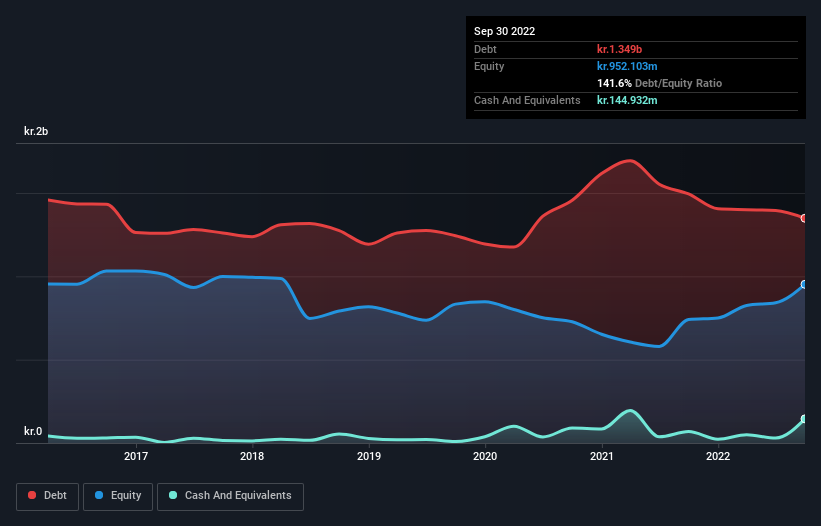
The external fund manager backed by Berkshire Hathaway's Charlie Munger, Li Lu, makes no bones about it when he says 'The biggest investment risk is not the volatility of prices, but whether you will suffer a permanent loss of capital.' So it seems the smart money knows that debt - which is usually involved in bankruptcies - is a very important factor, when you assess how risky a company is. We can see that PARKEN Sport & Entertainment A/S (CPH:PARKEN) does use debt in its business. But the real question is whether this debt is making the company risky.
When Is Debt Dangerous?
Debt is a tool to help businesses grow, but if a business is incapable of paying off its lenders, then it exists at their mercy. In the worst case scenario, a company can go bankrupt if it cannot pay its creditors. However, a more frequent (but still costly) occurrence is where a company must issue shares at bargain-basement prices, permanently diluting shareholders, just to shore up its balance sheet. Of course, plenty of companies use debt to fund growth, without any negative consequences. The first thing to do when considering how much debt a business uses is to look at its cash and debt together.
See our latest analysis for PARKEN Sport & Entertainment
How Much Debt Does PARKEN Sport & Entertainment Carry?
The image below, which you can click on for greater detail, shows that PARKEN Sport & Entertainment had debt of kr.1.35b at the end of September 2022, a reduction from kr.1.49b over a year. On the flip side, it has kr.144.9m in cash leading to net debt of about kr.1.20b.

A Look At PARKEN Sport & Entertainment's Liabilities
Zooming in on the latest balance sheet data, we can see that PARKEN Sport & Entertainment had liabilities of kr.708.1m due within 12 months and liabilities of kr.1.59b due beyond that. On the other hand, it had cash of kr.144.9m and kr.204.3m worth of receivables due within a year. So it has liabilities totalling kr.1.95b more than its cash and near-term receivables, combined.
This deficit casts a shadow over the kr.879.3m company, like a colossus towering over mere mortals. So we definitely think shareholders need to watch this one closely. At the end of the day, PARKEN Sport & Entertainment would probably need a major re-capitalization if its creditors were to demand repayment.
We measure a company's debt load relative to its earnings power by looking at its net debt divided by its earnings before interest, tax, depreciation, and amortization (EBITDA) and by calculating how easily its earnings before interest and tax (EBIT) cover its interest expense (interest cover). This way, we consider both the absolute quantum of the debt, as well as the interest rates paid on it.
PARKEN Sport & Entertainment has a debt to EBITDA ratio of 3.8 and its EBIT covered its interest expense 4.4 times. This suggests that while the debt levels are significant, we'd stop short of calling them problematic. However, the silver lining was that PARKEN Sport & Entertainment achieved a positive EBIT of kr.192m in the last twelve months, an improvement on the prior year's loss. There's no doubt that we learn most about debt from the balance sheet. But you can't view debt in total isolation; since PARKEN Sport & Entertainment will need earnings to service that debt. So if you're keen to discover more about its earnings, it might be worth checking out this graph of its long term earnings trend.
But our final consideration is also important, because a company cannot pay debt with paper profits; it needs cold hard cash. So it is important to check how much of its earnings before interest and tax (EBIT) converts to actual free cash flow. Happily for any shareholders, PARKEN Sport & Entertainment actually produced more free cash flow than EBIT over the last year. That sort of strong cash generation warms our hearts like a puppy in a bumblebee suit.
Our View
Mulling over PARKEN Sport & Entertainment's attempt at staying on top of its total liabilities, we're certainly not enthusiastic. But on the bright side, its conversion of EBIT to free cash flow is a good sign, and makes us more optimistic. Once we consider all the factors above, together, it seems to us that PARKEN Sport & Entertainment's debt is making it a bit risky. Some people like that sort of risk, but we're mindful of the potential pitfalls, so we'd probably prefer it carry less debt. There's no doubt that we learn most about debt from the balance sheet. However, not all investment risk resides within the balance sheet - far from it. These risks can be hard to spot. Every company has them, and we've spotted 2 warning signs for PARKEN Sport & Entertainment (of which 1 is a bit concerning!) you should know about.
Of course, if you're the type of investor who prefers buying stocks without the burden of debt, then don't hesitate to discover our exclusive list of net cash growth stocks, today.
New: Manage All Your Stock Portfolios in One Place
We've created the ultimate portfolio companion for stock investors, and it's free.
• Connect an unlimited number of Portfolios and see your total in one currency
• Be alerted to new Warning Signs or Risks via email or mobile
• Track the Fair Value of your stocks
Have feedback on this article? Concerned about the content? Get in touch with us directly. Alternatively, email editorial-team (at) simplywallst.com.
This article by Simply Wall St is general in nature. We provide commentary based on historical data and analyst forecasts only using an unbiased methodology and our articles are not intended to be financial advice. It does not constitute a recommendation to buy or sell any stock, and does not take account of your objectives, or your financial situation. We aim to bring you long-term focused analysis driven by fundamental data. Note that our analysis may not factor in the latest price-sensitive company announcements or qualitative material. Simply Wall St has no position in any stocks mentioned.
About CPSE:PARKEN
PARKEN Sport & Entertainment
Operates in the sports and entertainment industry in Denmark.
Fair value with mediocre balance sheet.
Similar Companies
Market Insights
Community Narratives



